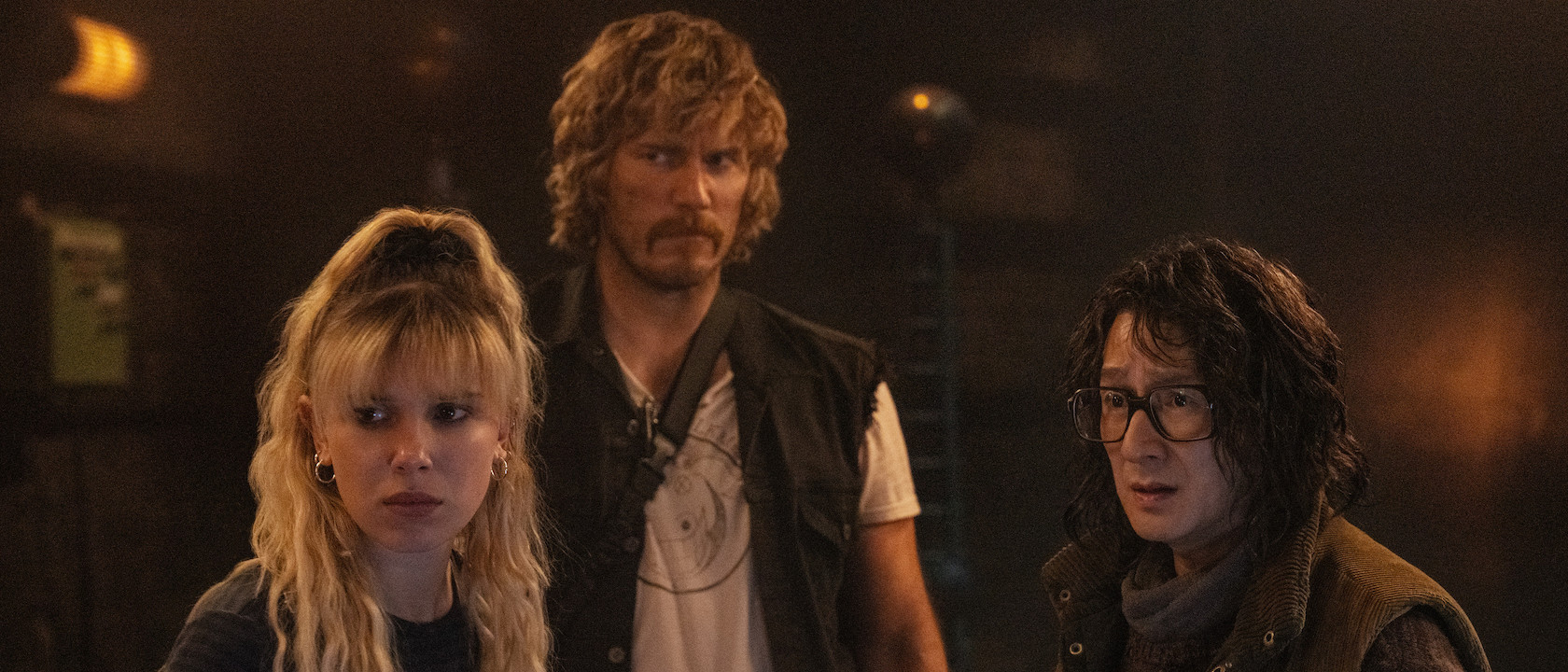If orchestrated properly, with adjusted stakes, tone, and atmosphere, there can be a beautiful, symbiotic relationship between intense action and comedy. A hero pulling off a rapid and vicious series of blows against an opponent can be savage and dramatic in one context, but it can also be so deliriously awesome that an audience’s first reaction is to laugh. Fast paced martial arts can be used for wonderful physical humor (see: the legendary career of Jackie Chan), and the best examples provide dual layers of entertainment: you marvel at the skill in all the ass-kicking, and cackle at the creativity in the choreography.
This is a sweet spot that filmmaker David Leitch knows well. After peppering funny moments in John Wick and Atomic Blonde at the start of his directorial career, he brilliantly utilized the action/comedy weapon that is Ryan Reynolds in Deadpool 2, and crafted some excellent physicality with the unique styles of Dwayne Johnson and Jason Statham in Fast & Furious Presents: Hobbs & Shaw. His latest, Bullet Train, is another effort that takes aim at that particular tonal target, this time with his most expansive ensemble yet, and it’s another success. With a sensibility that could be described as early Guy Ritchie with more specific action focus, it’s a movie that is both silly and skilled and inspires its primary star in particular to do energetic and engaging work.
Based on the novel Maria Beetle by Kōtarō Isaka, the film weaves multiple narrative threads through the cars of the titular bullet train as it speeds through the country of Japan – all of the protagonists being killers with their own particular reason and motivation for being aboard. Ladybug (Brad Pitt), for example, is a hired gun who has been tasked by his handler (Sandra Bullock) to perform what sounds like a simple job: find a briefcase marked with a train sticker and steal it. What he doesn’t know, though, is that said briefcase belongs to a pair of British hit men named Lemon (Brian Tyree Henry) and Tangerine (Aaron Taylor-Johnson), and that the contents include the recovered ransom for the kidnapped son (Logan Lerman) of a powerful crime lord known as The White Death.
Meanwhile, Kimura a.k.a. The Father (Andrew Koji) is on the bullet train because he is on a mission of vengeance – hunting down the person responsible for nearly killing his son by pushing the boy off of a building. What he doesn’t expect is that the individual he is looking for is a young woman identified as The Prince (Joey King), and that she has purposefully gotten him on the high speed rail with the intention of forcing him to execute an assassination attempt.
And while five killers sharing the space would be enough for most movies, Bullet Train actually has even more that pop in and surprise throughout the film’s runtime – and their roles are worth keeping as a secret pre-release.
Bullet Train has a chaotic storyline, but the pieces properly connect as a fun puzzle.
Narratively speaking, Bullet Train is a messy movie to put together, as focus briskly ping-pongs between the different players, but everything stays in harmony as the film persistently finds ways to build on each protagonist’s arc. This is particularly cool later in the movie as different characters are drawn together from individual angles and instant conflict is generated from their simple interaction.
The film is at its best when it keeps things simple, but it does let things go off the rails at times (if you’ll pardon the pun). This is especially true as it gets into the third act and it tries to pull off stunts like one of the leads leaping from a platform on to the back of the train as it leaves a station; it’s both a problem for the “rules” of the universe and in its strained use of visual effects. The movie also frequently tries to get a bit too cute and Tarantino-esque with what are admittedly familiar-but-not-quite-stock characters – the most prominent example being an ongoing and quickly tiresome gag with Lemon explaining that he understands people through the lens of Thomas The Tank Engine.
Primarily, though, it’s a movie that is able to generate its entertainment with engaging and quippy dynamics between the members of the ensemble, both when they are talking out their issues and trying to kill one another.
David Leitch puts a lot of exciting and weird fights in a confined space, and is at its best when working with a “less is more” philosophy.
Coming from a stunt background, both as a performer and a coordinator, David Leitch’s bread and butter remains deftly and specifically choreographed action sequences, and Bullet Train proves to be a terrific challenge and opportunity for his skills. Regardless of where you are in the titular transport, space is not a luxury, and the best fights in the movie are those that are being fought only between the characters, but against the limitations provided by the location.
There are guns, knives and explosives in the mix, but Bullet Train also has some terrific “found item” moments that add spice and humor to the various showdowns, whether it’s a pocketed cell phone saving a character’s life from a blade, a laptop making for a solid cudgel, a water bottle making for a useful projectile, or a venomous snake showing up at a perfect moment.
Once again we see David Leitch work a special magic turning dramatic and comedic actors into badasses with slick and stylish moves, and while everyone shows off some terrific skills, it’s very much the Brad Pitt show at the end of the day.
Brad Pitt’s joy in the role of Ladybug is palpable.
At the nexus of everything good in Bullet Train is Brad Pitt, who very clearly had a blast reuniting with David Leitch (who performed the actor’s stunts in films including Fight Club, The Mexican, Mr. And Mrs. Smith and Troy). He’s a joy to watch in action not just because of the talented craft he demonstrates in his physicality, but how he channels the psychology of the character. As we meet him, Ladybug is reluctantly getting back into his business following a number of important breakthroughs with his therapist, and Pitt does a fantastic job conveying that he doesn’t ever want to choose violence as a first answer – both via verbal pleas and defense-heavy moves. Action/comedy is a genre he should revisit a lot more often.
Bullet Train doesn’t aim to revolutionize hitman movies, but instead plays with a tongue-in-cheek vibe that lets you recognize the tropes and appreciate how the film plays with them. It’s a slick/goofy action movie that is both contained and wild, and a satisfying late summer release.

Eric Eisenberg is the Assistant Managing Editor at CinemaBlend. After graduating Boston University and earning a bachelor’s degree in journalism, he took a part-time job as a staff writer for CinemaBlend, and after six months was offered the opportunity to move to Los Angeles and take on a newly created West Coast Editor position. Over a decade later, he's continuing to advance his interests and expertise. In addition to conducting filmmaker interviews and contributing to the news and feature content of the site, Eric also oversees the Movie Reviews section, writes the the weekend box office report (published Sundays), and is the site's resident Stephen King expert. He has two King-related columns.











